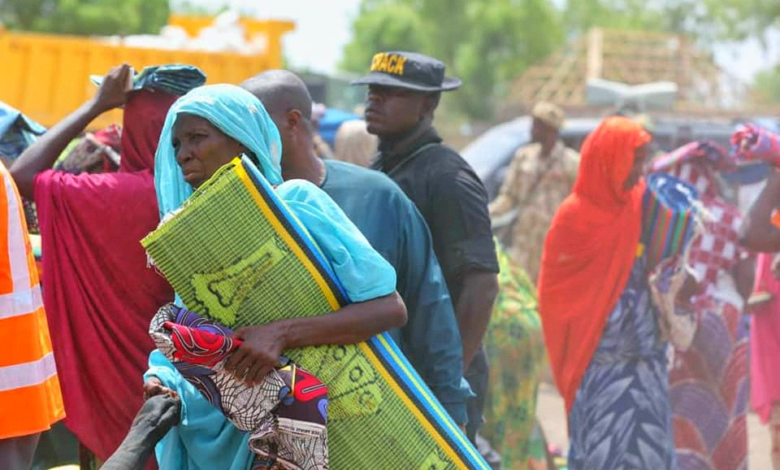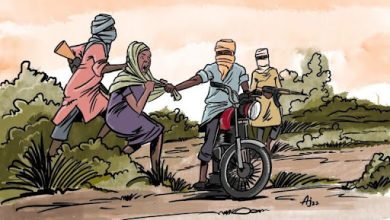Factcheck: Resettled IDPs In Borno Not Up To 2 Million
It would be difficult for the Borno government to resettle up to two million people, considering the state does not have that many internally displaced people to start with.

Borno state Governor Babagana Zulum on Wednesday, July 5, accused a United Nations representative of sharing incorrect information at the Lake Chad Basin Governors Forum in N’Djamena, Chad. But in doing so, he also made several inaccurate claims.
Expressing his disagreement with the UN Humanitarian Coordinator in Chad, Violet Kakyomya, the governor maintained that the security and humanitarian situation in his state has improved.
To prove this, he said: “Between 2019 and […], we resettled about two million people.”
“We opened up all routes in Borno state. We resettled many communities. We have increased access for farmers. Areas under cultivation have been increased by over 400 per cent. There is improved security situation in Dikwa region … There is improved security situation even in Chad and Cameroon.”
He also disagreed with the claim that there are increasing humanitarian needs.
“It is not right at all because people have started earning their means of livelihood by themselves. You, the humanitarian actors, have contributed immensely. There are a lot of success stories … As far as I’m concerned, there is tremendous security, humanitarian improvement in the Northeast.”
“Gone are the days that we shall come here and sit down and listen to fake information,” the governor protested.
A video of Zulum’s address was shared in a tweet on Wednesday, which has been viewed over 304,000 times. The video has also appeared on Facebook, with some of the uploads gathering thousands of views. It has equally been uploaded to YouTube and quoted in several publications.
Checks by HumAngle showed that the resettlement figure shared by Zulum at the forum was inflated. In a speech the governor himself delivered last December to launch his reelection campaign, he gave a different figure.
“We are even more grateful because with your support, we were able to build over 10,000 urban and low-cost houses and reconstructed communities in which we have resettled close to one million displaced citizens, and we massively supported them with livelihoods,” he said, citing his achievements since he was first elected governor in 2019.
No major camp has been shut down in the state since this statement.
On May 29, as Zulum was sworn in for a second term, he said the number of newly built resettlement homes had increased to 20,000 but maintained that “one million fellow citizens are no longer living in IDP camps”.
Besides, it would be difficult for the Borno government to resettle up to two million people, considering the state does not have that many internally displaced people to start with.
According to a Feb. 2023 report from the UN Migration Agency, IOM, there were 2.38 million IDPs in Northeast Nigeria. Of this number, 1.8 million were in Borno state.
The IOM acknowledged that there were nearly 900,000 returnees in Borno as of Nov. 2022. About 36 per cent of them, however, went back to their locations of origin between 2014 and 2020. “The gradual increase in return population is most evident in Borno State and is predominantly due to the camp closures within the urban areas of Maiduguri which led IDPs to relocate to their places of habitual residence within the state,” the UN agency noted.
But then the returnee population across the BAY states of Borno, Adamawa, and Yobe is 2.1 million, about 83 of whom went back to their communities before 2021.
Other claims by the governor
Zulum said at the forum that areas under cultivation in Borno state had increased by 400 per cent, but we could not find any statistics to back this. The National Agricultural Sample Survey, which includes the number of hectares cultivated by peasant farmers across the country, has not been released since 2011.
But the latest IOM displacement tracking report mentioned that only 59 per cent of IDPs in camps and host communities in Borno had access to land for cultivation, compared to 97 per cent in Adamawa and 98 per cent in Yobe. Returnees, however, have better luck. Eighty-five per cent of returnees in Borno had access to farmlands, compared to 94 per cent in Adamawa and 98 per cent in Yobe.
Zulum additionally claimed that the security situation had improved in Cameroon and Chad. He said in Borno state, it had improved by over 80 per cent and that no single bomb attack was recorded in Maiduguri, the state capital, in the last two years.
Bomb attacks were indeed recorded in Maiduguri within that period.
In Dec. 2021, multiple explosions hit the city, killing four people and injuring eight others, as confirmed by the state government. Earlier that year — over two years ago this time — Boko Haram fired Rocket-Propelled Grenades (RPGs) that hit several locations in Maiduguri and killed 17 people.
But the governor is right about improvements in security in Borno. Analysis of data compiled by the Armed Conflict Location & Event Data Project (ACLED) showed that the number of fatalities dropped by 91 per cent between 2015, which was the peak of the insurgency, and last year. The trend is, however, different if we instead consider the frequency of violent incidents in the state.
In Chad and Cameroon, there hasn’t been a significant improvement in security as judged by the number of violent incidents and people killed.
Support Our Journalism
There are millions of ordinary people affected by conflict in Africa whose stories are missing in the mainstream media. HumAngle is determined to tell those challenging and under-reported stories, hoping that the people impacted by these conflicts will find the safety and security they deserve.
To ensure that we continue to provide public service coverage, we have a small favour to ask you. We want you to be part of our journalistic endeavour by contributing a token to us.
Your donation will further promote a robust, free, and independent media.
Donate HereStay Closer To The Stories That Matter




